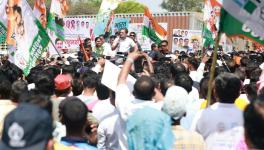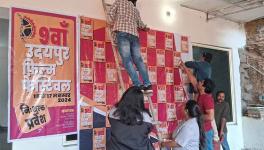Nationalism of RSS-BJP is Blatant Communalism
From “Acche din” to “Bharat Mata Ki Jai” to “Vande Mataram” to “Jai Sri Ram,” – is the five years of former Rashtriya Swayamsevak Sangh (RSS) pracharak, Narendra Modi-led Bharatiya Janata Party (BJP) government, in a nutshell. “Acche din” literally meaning good days, was the promise of “development” of Modi during his campaign in the 2014 Lok Sabha elections. However, when the BJP formed it’s government with 282 seats, one was certain that India would witness a polity that is communally turbulent and based on emotions. Now, five years later, as the polling for the Lok Sabha elections 2019 is about to end, the promised “development” is not to be seen, but what is rampant is hatred-filled cow vigilante groups and other stronger Hindutva forces; citizens who are afraid to question the government; educational, financial, research institutions infiltrated with the Sangh Parivar members.
Since the promised “development” is not to be seen, the BJP this time made nationalism it’s issue and Narendra Modi the godman figure to ask for votes. Not paying any heed to the orders of the Supreme Court, Modi-Shah used the Pulwama attacks and air strikes in Balakot for reinforcing the discourse of Hindutva nationalism of VD Savarkar, that equated a patriot to a Hindu and concluding every Indian is a Hindu. For example, speaking in the election campaign rally in Bagalkot district of Karnataka, the PM had asked, "Now tell me, where is the Congress and the JD(S) vote bank? Is it in Bagalkot or Balakot? This Congress-JD(S) has to decide.” At Chikkodi, he was reported saying, "Your vote will decide whether those chanting Bharat Mata ki jai (Hail Bharat Mata) will be respected or tukde tukde gang (anti-nationals) will come to you and chant slogans about Bharat ki barbadi (Destruction of India).”
Also Watch: RSS and Hindu Mahasabha Were Never Nationalists
One of the tools that the BJP used across the country were the mobile audio-video screens, constantly playing a video of the BJP paying tribute to the victims of the Pulwama attack. Why was this done, if not to instigate the emotions of the people towards Narendra Modi who was “responsible” for “teaching” a lesson to Pakistan by carrying out the airstrikes.
Politics of Slogans
On May 14, 2019, in a rally of Amit Shah in Kolkata, there were people in the costumes of the favourite mythological character of the party, Ram, in whose name the party has a history of asking for votes, and Sita and Hanuman. The slogan being raised was Jai Sri Ram (Hail Ram).
On one hand, by not speaking anything about poverty, growing unemployment, growing inequality, atrocities against the minorities, and instead talking only about nationalism and national security, both Modi-Shah created a false narrative of the nation in danger, in an attempt to cover up the failures of the government in the last five years.
Also Read: Elections 2019: The Unravelling of BJP’s Election Campaign
Coming to power in 2014, they made the slogans Bharat Mata Ki Jai and Vande Mataram (Salute to Motherland), identity markers of a “true Indian.” One can very well remember the heated debates on media and elsewhere about Indians not chanting Bharat Mata Ki Jai. The Yoga teacher and business tycoon Baba Ramdev, at a public function in Rohtak had gone to the extent of saying that lakhs of people would be beheaded for their refusal to chant the slogan; and the Maharashtra Chief Minister Devendra Fadnavis had said, those who did not chant the slogan, had no right to live in the country. BJP MLA in Uttar Pradesh, Surendra Singh, who had predicted that India will be a Hindu Nation by 2024 had also said that those who don’t chant the slogan were Pakistanis.
Apart from these, there were instances where people who did not stand up for the national anthem in the cinema theatres were thrashed. One must note that this non-issue became an issue only after the BJP formed it’s government. Now, looking back, it seems as though Modi-Shah and the BJP knew what the issue for the 2019 elections would be, when they formed their government in 2014 itself and were preparing themselves by politicising these slogans. These slogans taking precedence in these election campaigns is a deja vu of sorts.
The “Nationalism” of the BJP and Modi-Shah
Sadanand Menon, talking of cultural nationalism, writes, “Cultural nationalism, by any definition, is a rogue version of nationalism which is already present in concepts of the nation state. Its cunning agenda is to evacuate all ideas of political rights from the idea of a nation state and transplant in its place, ideas of cultural rights, obviously weighted in favour of concepts of primogeniture, racial purity and genetic ancestry as contained in ideas like janmabhumi or birthland/homeland and other emotive aspects that touch upon shared language, food, and consanguinity. BJP and its ideologues of the RSS have always favoured cultural nationalism.”
Also Read: ‘Future of Bharat’: How RSS is Masking its Real Face
Unlike, the Ram Janmabhoomi movement of 1990’s that was out and out communal in it’s agenda, this election, by equating Pakistan to Muslims, India to Hindu and taking up the issues of immigrants from Bangladesh and Rohingyas and by making them into religious issues, the party went on instigating sentiments in the name of nationalism. The BJP’s attempts led the current sarsanghchalak (head) of the RSS, Mohan Bhagwat, to try and distance the organisation from the BJP by claiming that the RSS is a non-political organisation in a three-day lecture series in Delhi from September 17-19, 2018. The current election campaign rallies of the BJP is the best example one can find to explain what cultural nationalism is.
As opposed to the cultural nationalism of the BJP-RSS, that puts the country way above the rights and well being of it’s people, Rabindranath Tagore, writing in Nationalism in 1917, says, “it is my conviction that my countrymen will gain truly their India by fighting against the education which teaches them that a country is greater than the ideals of humanity.” The RSS and Modi-Shah, as argued earlier, see benefit in encouraging the citizens to put the country above their problems and issues.
Get the latest reports & analysis with people's perspective on Protests, movements & deep analytical videos, discussions of the current affairs in your Telegram app. Subscribe to NewsClick's Telegram channel & get Real-Time updates on stories, as they get published on our website.























